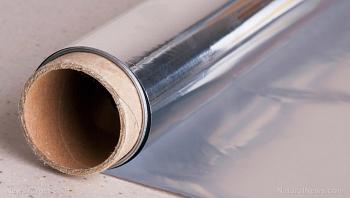Have you worn, eaten or injected this cancer-causing metal lately?
(Natural News) We’re constantly learning more about the health dangers in our environment thanks to ongoing research, and while this can be incredibly valuable information, it sometimes feels like everything around us causes cancer. That’s definitely the case when it comes to one metal you might not have given much thought to before: aluminum.
In fact, many of us believe that aluminum is pretty harmless. After all, we cook with it and store food in it, so how bad can it be? The answer is quite disappointing: A study published in the Journal of Inorganic Biochemistry shows that exposure to the metal can increase the invasive and migratory properties of human breast cancer cells. Because it’s the spreading of breast cancer tumors rather than the presence of the primary tumor that is behind breast cancer mortality, it’s an extremely significant – and concerning – finding. Other studies have found that women with breast cancer have higher levels of aluminum in their bodies than those without the disease.
Unfortunately, it’s not just cancer that you have to worry about when it comes to aluminum. Oral exposure to the metal has been linked to Alzheimer’s disease and other neurological problems, along with kidney disease. It can make its way into breast milk, and it can also impact children’s bones.
Aluminum is difficult to avoid
Aluminum is everywhere in our environment. For example, it’s commonly used in antiperspirants, where it’s able to make its way into your bloodstream through the skin and cause problems. A study in the Journal of Applied Toxicology demonstrated how aluminum chloride, the main type of aluminum found in antiperspirants and deodorants, can change healthy breast cells into cancerous ones. While the researchers in that study said their findings don’t officially mean aluminum is a breast carcinogen, they do call the safety of its use in deodorant into question.
In addition to deodorants, aluminum can be found in several other types of personal care products, including cosmetics and astringents. It’s also presents in antacids, buffered aspirin and other drugs. Powdered aluminum is used in fireworks, and aluminum compounds are used for water treatment.
It’s also found throughout many kitchens, whether it’s in the pots and pans people cook their food with or the beverage cans and aluminum foil used for storing food and grilling. According to the Agency for Toxic Substances and Disease Registry, it is also added during the processing of some foods, including baking powder, anticaking agents, coloring agents and flour. They report that the average American adult is eating anywhere from 7 to 9 milligrams of aluminum each day in their food.
There’s a strong chance you or your children have been injected with aluminum if you’ve ever had a vaccine. It’s often used an adjuvant in vaccines such as those for hepatitis A, influenza B, HPV, DTP and DTaP.
Some of the early symptoms of aluminum toxicity are easy to dismiss or attribute to other causes, such as headaches, depression and dry skin. It’s often not noticed until it’s too late and more serious symptoms have set in, such as muscle problems and memory loss.
Aluminum is widely distributed around the world and is the most abundant metal in our planet’s crust. It’s easy to obtain and very affordable, so it’s going to take a big effort to avoid it. However, as we learn more and more about its potential dangers, it’s an effort that could very well reduce your risk of several diseases. Be vigilant about the personal care products you use, avoid aluminum additives in your food and cookware, and watch out for aluminum adjuvants in vaccines.





